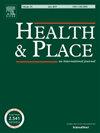Who goes foraging in Bristol, UK and why? A qualitative investigation into wild food acquisition and food justice
IF 3.8
2区 医学
Q1 PUBLIC, ENVIRONMENTAL & OCCUPATIONAL HEALTH
引用次数: 0
Abstract
In recent years, foraging for wild foods has grown in popularity in cities. Globally, urban foragers are diverse; motivations span contribution to the food basket, healthier living, and accessing urban nature. Research to date highlights ease of access across socio-demographic groups. There is little empirical evidence in the UK on how social identity intersects with the practices and meanings of foraging: who forages, what motivates them, and how are questions of equity understood? This paper takes a case study from Bristol (UK) to explore how foragers describe their motivations, their own and others social identities, and challenges of equitable access.
Data were generated from fieldwork with a foraging group and qualitative walking interviews (n = 15) in foraging locations. Qualitative thematic analysis identified three key themes; social identity, motivation and food justice.
Foraging in Bristol was framed as a lifestyle pursuit by the largely (self-identified) middle-class participants. Reported motivations centre on improving health through ‘nature cure’, exercising individual agency in food provision, and environmentalism. The rationales for foraging suggest subtle class distinctions in relation to food choices, and participants identify knowledge and experiential limitations, and sociocultural factors, as contributing to others' lack of access.
Findings contribute to the literature on urban foraging in the context of food justice. In one UK city, foraging was not primarily understood as a subsistence activity, but as a component of a particular lifestyle orientation. To improve equity of access to the subsistence benefits of foraging, better understanding of the social meanings attributed to foraging are needed.
谁去英国布里斯托尔觅食?为什么?野生食物获取与食物公平的质性调查。
近年来,在城市中寻找野生食物越来越受欢迎。在全球范围内,城市觅食者是多种多样的;他们的动机包括为食物篮子做出贡献、更健康的生活方式和接触城市自然。迄今为止的研究强调了社会人口群体获取的便利性。在英国,很少有经验证据表明社会身份与觅食的实践和意义是如何交叉的:谁在觅食,他们的动机是什么,以及如何理解公平问题?本文以英国布里斯托尔的一个案例研究为例,探讨采集者如何描述他们的动机、他们自己和他人的社会身份,以及公平获取的挑战。数据来自觅食群体的实地调查和在觅食地点进行的定性步行访谈(n = 15)。定性专题分析确定了三个关键主题;社会认同,动机和食物正义。在布里斯托尔,觅食被大部分(自我认同的)中产阶级参与者视为一种生活方式的追求。报告的动机集中在通过“自然疗法”改善健康、在粮食供应中行使个人能动性和环保主义。觅食的基本原理表明,在食物选择方面存在微妙的阶级差异,参与者认为知识和经验的限制以及社会文化因素是导致其他人无法获得食物的原因。研究结果有助于在食物公正背景下的城市觅食文献。在英国的一个城市,人们并不认为觅食是一种谋生活动,而是一种特定生活方式的组成部分。为了提高获得觅食生存利益的公平性,需要更好地理解觅食的社会意义。
本文章由计算机程序翻译,如有差异,请以英文原文为准。
求助全文
约1分钟内获得全文
求助全文
来源期刊

Health & Place
PUBLIC, ENVIRONMENTAL & OCCUPATIONAL HEALTH-
CiteScore
7.70
自引率
6.20%
发文量
176
审稿时长
29 days
期刊介绍:
he journal is an interdisciplinary journal dedicated to the study of all aspects of health and health care in which place or location matters.
 求助内容:
求助内容: 应助结果提醒方式:
应助结果提醒方式:


